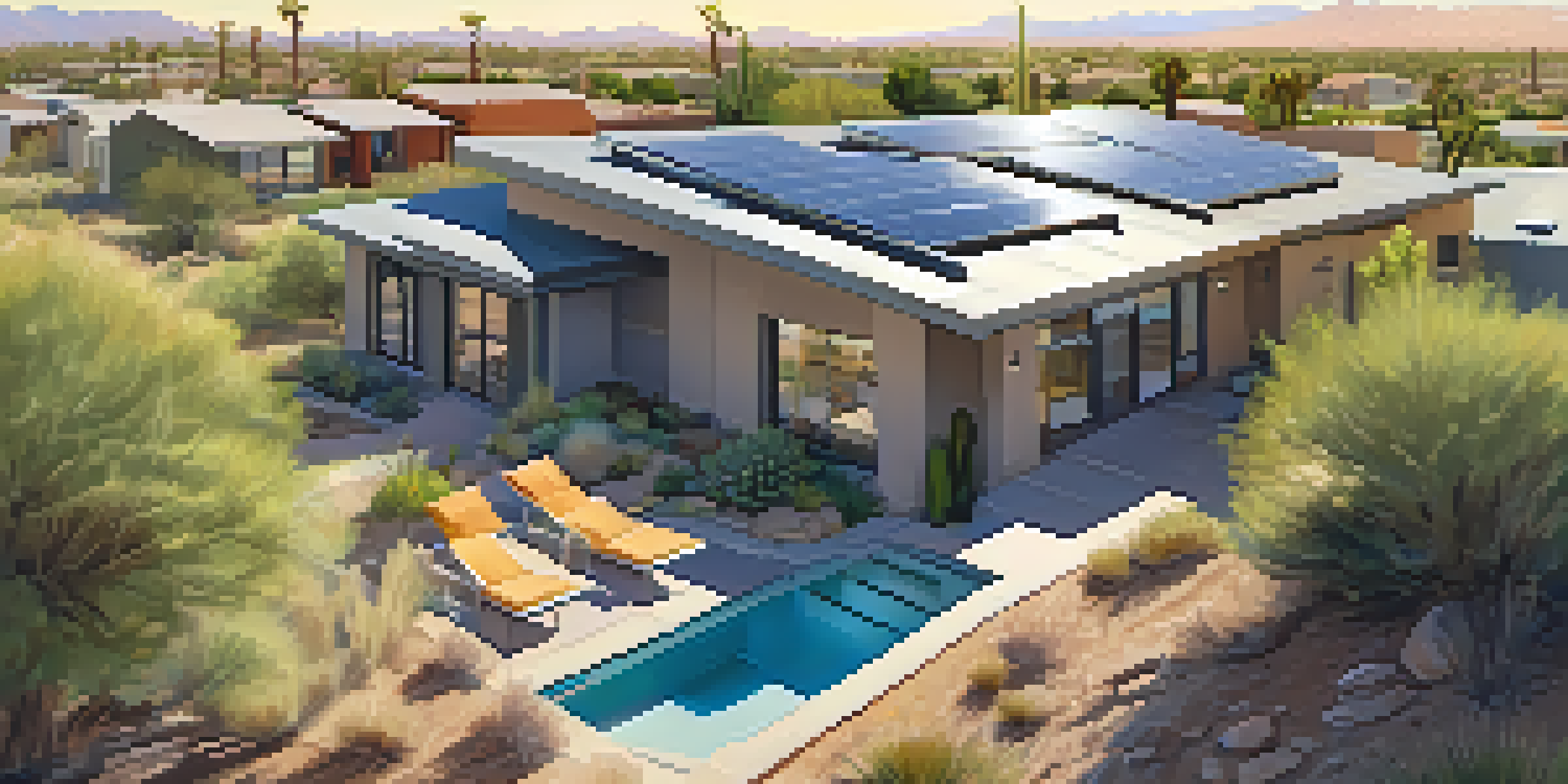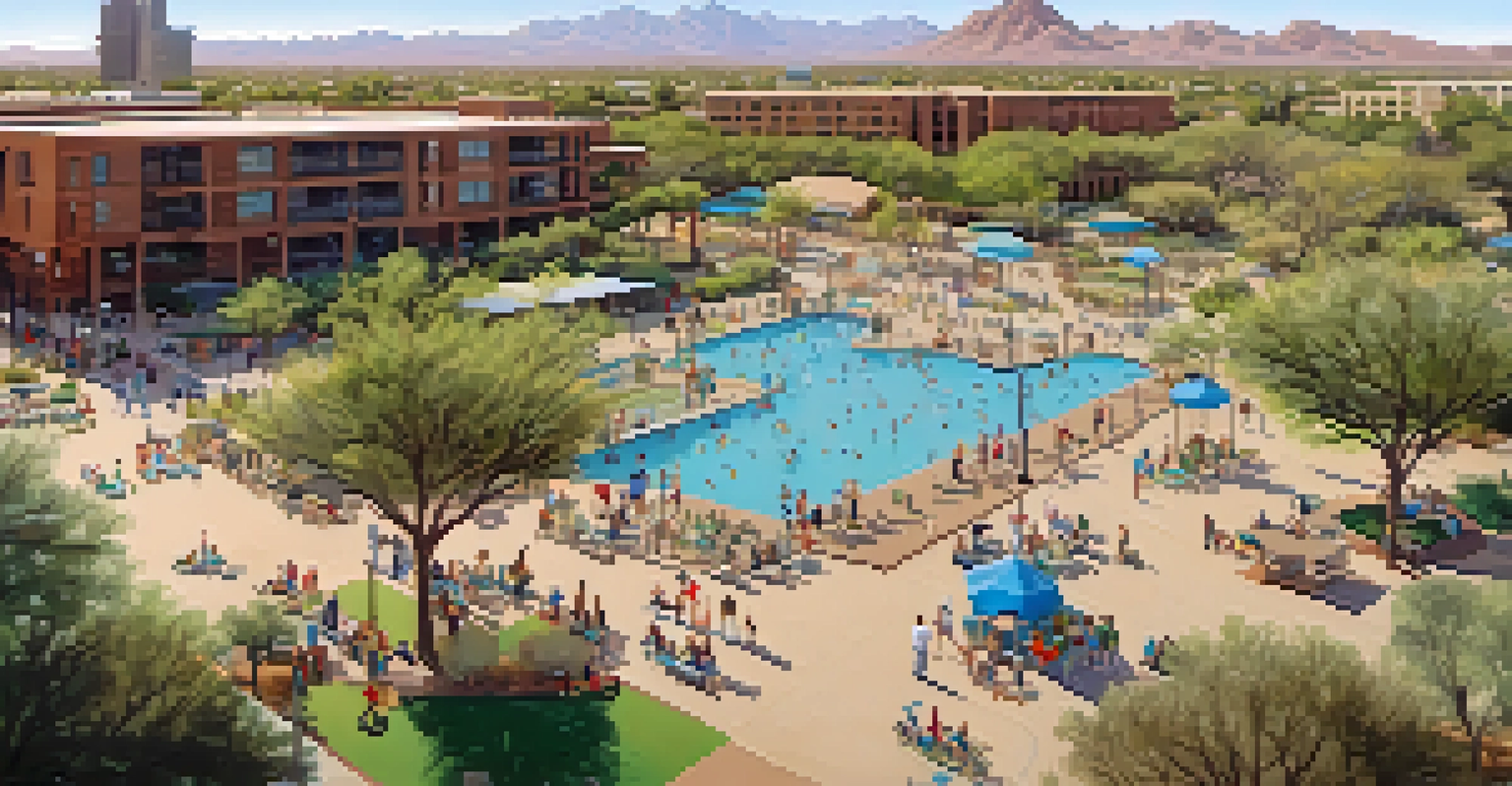Impact of Climate Change on Phoenix Real Estate Market Trends

Understanding Climate Change and Its Effects
Climate change refers to long-term shifts in temperatures and weather patterns. While these changes can occur naturally, human activities have accelerated the process, leading to more extreme weather events. In cities like Phoenix, characterized by its desert climate, the implications of climate change are becoming increasingly apparent.
Climate change is no longer some far-off problem; it is affecting real people, real places, and real livelihoods today.
From rising temperatures to prolonged droughts, these shifts can dramatically affect urban living. For instance, higher average temperatures mean residents are more reliant on air conditioning, which can lead to increased energy costs. Additionally, changes in rainfall patterns can affect water supply, a critical issue in arid regions.
Understanding these effects is crucial for homeowners and potential buyers alike, as they influence property values and market stability. As weather patterns continue to evolve, the real estate market must adapt to these new realities, impacting everything from new builds to resale values.
Rising Temperatures and Homebuyer Preferences
As temperatures in Phoenix continue to rise, homebuyer preferences are shifting. Many are now seeking properties with energy-efficient features, such as solar panels or improved insulation. These features not only offer comfort but also help mitigate rising energy costs during extreme heat waves.

Additionally, outdoor living spaces are becoming increasingly popular as people look for ways to enjoy the warmer months while staying cool. Buyers are drawn to homes with shaded patios, pools, or proximity to parks where they can escape the heat. This trend is reshaping the types of properties that are in demand.
Climate Change Affects Home Values
The evolving impacts of climate change are influencing property values and market stability, making sustainability a priority for buyers.
Real estate agents are adapting by focusing on these features in listings, highlighting energy efficiency as a key selling point. As awareness grows about the impacts of climate change, homebuyers are becoming more conscious of how their choices contribute to their long-term comfort and financial stability.
Water Scarcity and Its Market Implications
Water scarcity is a pressing concern for Phoenix, a city already facing significant drought challenges. The limited availability of water influences real estate decisions, as potential buyers are increasingly aware of the long-term sustainability of their investments. Properties with efficient water usage systems, like xeriscaping, are becoming more attractive.
Sustainability is no longer about doing less harm. It’s about doing more good.
Moreover, the need for responsible water management can lead to stricter regulations on new developments. Developers must consider water access and conservation measures, which can increase costs but also enhance property values in the long run. Buyers often prioritize homes that demonstrate a commitment to sustainability.
As the city grapples with these water issues, the market may see a shift towards properties that are more resilient to climate-related challenges. This change not only reflects a growing awareness of environmental issues but also hints at the future of urban planning in desert regions.
Insurance Costs and Climate Change Risk
With climate change leading to more extreme weather events, insurance companies are reevaluating their risk assessments. For homeowners in Phoenix, this may mean higher premiums as insurers account for potential damages from heatwaves and droughts. Understanding these costs is essential for buyers when budgeting for a new home.
Additionally, properties in areas deemed at risk may face even steeper insurance rates, impacting overall affordability. Buyers must navigate these factors, as insurance can significantly affect long-term ownership costs. In some cases, homes that were once considered safe investments may become less desirable due to rising insurance costs.
Energy Efficiency Drives Buyer Demand
As temperatures rise, homebuyers are increasingly seeking energy-efficient features to combat higher energy costs and ensure comfort.
Real estate professionals are encouraged to stay informed about these trends to better advise clients. By factoring in potential insurance increases, buyers can make more informed decisions, ensuring their investments remain sound in an evolving climate.
Impact on Housing Development and Design
Climate change is influencing how new homes are designed and built in Phoenix. Developers are now prioritizing climate-resilient features, such as improved ventilation, energy-efficient appliances, and drought-resistant landscaping. These elements are becoming essential for meeting the demands of environmentally conscious buyers.
Moreover, urban planning is shifting to incorporate more green spaces and sustainable infrastructure. This not only enhances the aesthetic appeal of neighborhoods but also helps mitigate the urban heat island effect, where cities become significantly warmer than surrounding areas. Buyers are drawn to developments that reflect these considerations.
Incorporating climate-conscious design not only benefits residents but also can lead to increased property values. As more people recognize the importance of sustainable living, homes that embrace these principles are likely to stand out in a competitive market.
The Rental Market and Climate Considerations
The rental market in Phoenix is also feeling the effects of climate change. Landlords are increasingly investing in energy-efficient upgrades to attract environmentally conscious tenants. These upgrades can lead to lower utility bills, making properties more appealing in a competitive rental landscape.
Additionally, properties that offer climate-resilient features may command higher rental rates. Tenants are willing to pay a premium for homes that provide comfort and sustainability, reflecting a broader shift in consumer preferences. Understanding these trends can help landlords maximize their investments.
Water Scarcity Shapes Real Estate Choices
Water scarcity concerns in Phoenix are prompting buyers to prioritize properties with sustainable water management systems.
As climate awareness grows, renters are becoming more selective, often prioritizing sustainability over traditional amenities. This shift is encouraging property owners to rethink their strategies, ensuring that their offerings align with the evolving expectations of potential tenants.
Future Outlook: Adaptation and Resilience in Real Estate
Looking ahead, the Phoenix real estate market must adapt to the realities of climate change. Developers, buyers, and policymakers will need to work together to create resilient communities that can withstand environmental challenges. This collaboration is key to ensuring sustainable growth and property values in the face of ongoing climate issues.
Investing in sustainable infrastructure and energy-efficient homes can lead to long-term benefits not only for residents but also for the community as a whole. As cities prioritize climate resilience in their planning, properties that embrace these changes are likely to thrive. This shift can enhance the overall quality of life for residents.

Ultimately, the future of the Phoenix real estate market lies in its ability to adapt and innovate in response to climate challenges. By understanding these trends and making informed choices, stakeholders can contribute to a sustainable and thriving housing market.